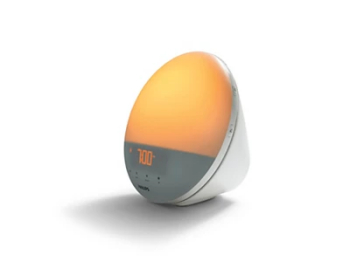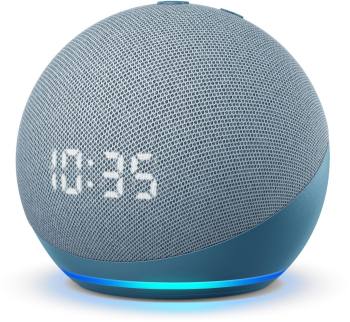When it comes to upgrading your bedroom with smart technology, two popular options are the Philips SmartSleep HF3520/60 and the Amazon Echo Dot with Clock (4th Gen). While both devices offer unique features, they cater to different needs and preferences. In this comparison, we'll delve into the details of each product, exploring their strengths and weaknesses, particularly in relation to their functionality as alarm clocks.
Philips SmartSleep HF3520/60
The Philips SmartSleep HF3520/60 is a sleep-focused device designed to simulate a sunrise, helping your body wake up more naturally. This smart alarm clock uses a combination of light and sound to wake you up during your lightest sleep phase, making it easier to start your day feeling refreshed. The device features a colored LED display that gradually brightens over a set period, mimicking the sunrise, and includes FM radio and USB charging ports.
As an alarm clock, the Philips SmartSleep HF3520/60 excels in its ability to wake you up gently, using a simulated sunrise to signal the start of your day. The device's sleep tracking features also provide valuable insights into your sleep patterns, helping you identify areas for improvement. However, it lacks voice assistant capabilities and smart home integration, which might be a drawback for those invested in the Amazon Alexa ecosystem.
Amazon Echo Dot with Clock (4th Gen)
The Amazon Echo Dot with Clock (4th Gen) is a compact smart speaker that combines the functionality of an alarm clock with the power of Amazon's virtual assistant, Alexa. This device features a built-in clock display, allowing you to easily check the time, and includes a range of alarm options, including voice-controlled alarms and customizable routines. With Alexa integration, you can control your smart home devices, play music, set reminders, and access a wide range of skills.
As an alarm clock, the Amazon Echo Dot with Clock (4th Gen) offers flexibility and customization, allowing you to set multiple alarms, choose from various sounds, and even use voice commands to wake up. The device's small size and sleek design make it a great addition to any bedside table. However, some users might find the lack of a traditional alarm clock interface and the reliance on voice commands to be less intuitive than dedicated alarm clocks like the Philips SmartSleep HF3520/60.
Comparison
When comparing the Philips SmartSleep HF3520/60 and the Amazon Echo Dot with Clock (4th Gen) as alarm clocks, it's essential to consider your specific needs and preferences. If you prioritize a gentle, simulated sunrise wake-up experience and sleep tracking features, the Philips device might be the better choice. On the other hand, if you value the convenience of voice control, smart home integration, and access to a wide range of Alexa skills, the Amazon Echo Dot with Clock (4th Gen) is likely the superior option.
In terms of price, the Philips SmartSleep HF3520/60 tends to be more expensive than the Amazon Echo Dot with Clock (4th Gen), which might be a factor for budget-conscious consumers. However, the Philips device's unique sleep-focused features and high-quality construction may justify the additional cost for those seeking a dedicated sleep solution.
Ultimately, both devices offer innovative approaches to alarm clocks, but they cater to different needs and preferences. By considering your priorities and weighing the strengths and weaknesses of each product, you can choose the ideal alarm clock for your bedroom, ensuring a more restful and refreshing sleep experience.






























